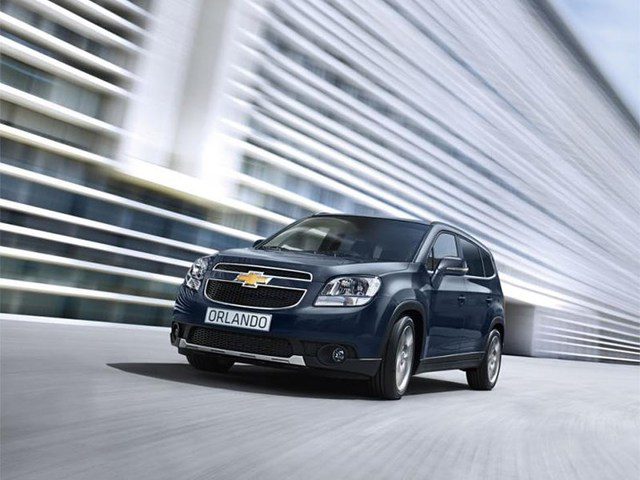
Short test: Chevrolet Orlando 2.0D (120 kW) LTZ
Already, most of us do not understand why seven seats are needed. However, large families with such cars can only shake hands. Even in Orlando. Usually buyers of such cars are also less demanding, at least in terms of design.
Much more important is the space, the flexibility of the seats, the size of the trunk, the choice of engine and, of course, the price. In many cases, this is very important, and if you get a lot of "music" for little money, the purchase is considered excellent. We're not saying the Orlando is a cheap car, but compared to the competition and the fact that its equipment is (maybe) top notch, it's certainly at least a smart buy.
Of course, it's commendable that the seats in the last two rows can be folded down easily, creating a perfectly flat bottom. Of course, this increases the usability of Orlando, as it offers a large luggage compartment so quickly and easily. The basic configuration of all seven seats only has 110 liters of luggage space, but when we fold down the rear row, the volume increases to 1.594 liters. However, this is enough for Orlando to be used as a campervan. Orlando also doesn't skimp on warehouses and boxes. They are enough for the whole family, some are also original and even useful.
The average user is already satisfied with the basic Orlando hardware, and even more so with the LTZ hardware package (just like on the test machine). Of course, all the equipment is too much to list, but automatic air conditioning, dimmable interior rearview mirror, CD CD MP3 radio with USB and AUX connectors and steering wheel control switches, ABS, TCS and ESP, six airbags, electrically adjustable and folding door mirrors and 17-inch alloy wheels.
An even bigger advantage of the Orlando test was the engine. The two-liter four-cylinder turbodiesel demonstrates 163 "horsepower" and 360 Nm of torque, which is enough to accelerate from 0 to 100 km / h in exactly 10 seconds and a top speed of 195 km / h. , quickly.
Of course, keep in mind that the Orlando is not a low sports sedan, so the higher center of gravity also results in more body sway when cornering. Starting on poor or wet surfaces can also be a little tricky, as a lot of headroom expresses a desire to turn the drive wheels when starting too fast. This prevents the anti-slip system from working, but the procedure is still not necessary.
During testing of the first Orlando with the same engine, we criticized the automatic transmission, but this time it went much better. This isn't great as it gets stuck when shifting too (especially when choosing first gear), but that's a problem with most mid-range gearboxes.
Overall, however, the gear lever is simple enough to operate without causing a bad mood. Of course, the most important fact is that the manual transmission is much more engine or fuel economy friendly as it is significantly less than when combined with an automatic transmission, which was significantly (too) large even in our test.
Text: Sebastian Plevnyak
Chevrolet Orlando 2.0D (120 kW) LTZ
Basic data
Technical information
| engine: | 4-cylinder - 4-stroke - in-line - turbodiesel - displacement 1.998 cm3 - maximum power 120 kW (163 hp) at 3.800 rpm - maximum torque 360 Nm at 2.000 rpm. |
|---|---|
| Energy transfer: | front wheel drive engine - 6-speed manual transmission - tires 235/45 R 18 W (Bridgestone Potenza RE050A). |
| Capacity: | 195 km/h top speed - 0-100 km/h acceleration in 10,0 s - fuel consumption (ECE) 7,9/4,9/6,0 l/100 km, CO2 emissions 159 g/km. |
| Mass: | empty vehicle 1.655 kg - permissible gross weight 2.295 kg. |
| External dimensions: | length 4.652 mm – width 1.835 mm – height 1.633 mm – wheelbase 2.760 mm – trunk 110–1.594 64 l – fuel tank XNUMX l. |
Our measurements
| T = 27 ° C / p = 1.112 mbar / rel. vl. = 44% / odometer status: 17.110 km | |
| Acceleration 0-100km: | 10,0s |
|---|---|
| 402m from the city: | 17,1 years ( 130 km / h) |
| Flexibility 50-90km / h: | 10,1 / 12,5s (IV/V) |
| Flexibility 80-120km / h: | 11,2 / 14,1s (Sun./Fri.) |
| Maximum speed: | 195km / h (WE.) |
| test consumption: | 7,4 l / 100km |
| Braking distance at 100 km / h: | 38,2m |
| AM table: | 39m |
evaluation
Chevrolet Orlando is a car that can instantly captivate or distract you with its shape. However, it's true that the seven seats are a big plus, especially since they're simple and fold nicely.
We praise and reproach
engine
front seats
folding seats into a flat bottom
warehouses
thrust
interfering trunk thread when folding the rear seats